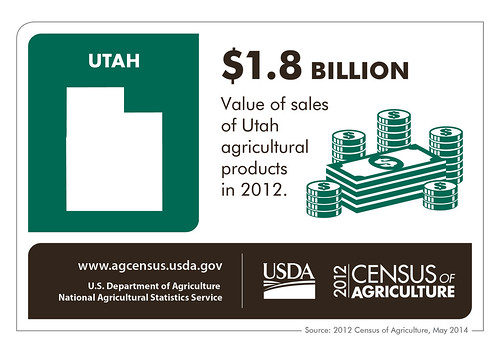
The Census of Agriculture is the most complete account of U.S. farms and ranches and the people who operate them. Every Thursday USDA’s National Agricultural Statistics Service will highlight new Census data and the power of the information to shape the future of American agriculture.
Utah agriculture is varied and prevalent across the state. The 2012 Census of Agriculture showed that our farms and ranches occupy 10.97 million acres of land, or more than a fifth of the total land in Utah.
In 2012, our state’s farmers sold more than $1.8 billion worth of agricultural products, with one-third in crop sales and two-thirds in livestock and poultry and their products. In contrast to sales, farm and ranch expenses totaled almost $1.6 billion with feed and labor being the two highest expenditures. According to a survey done by Utah State University in 2012, when multiplier effects are included, agricultural processing and production account for $17.5 billion in total economic output in our state.
Cattle and calves were the number one livestock commodity in the state, with sales totaling more than $364 million. Milk from cows was the top selling animal product, with sales totaling more than $326 million. Hogs and poultry were some of the other major livestock commodities sold by Utah farmers, with sales totaling $290 million and $140 million respectively.
On the crop side, hay was our number one commodity, with sales reaching nearly $300 million in 2012. It was also the leading crop in terms of acreage, followed by wheat, corn, and safflower.
Utah also has a vibrant fruit and vegetable industry. The top fruit, in terms of acreage, in the state are tart cherries, peaches, apples, and sweet cherries. The top vegetables, also ranked by acreage, are sweet corn, onions, potatoes, and pumpkins. In 2012, fruit sales totaled more than $31 million, while vegetable sales totaled more than $19 million.
At the county level, Beaver County led the pack with the most agriculture sales in the state and Utah, Millard, Box Elder, and Sanpete counties round out the top five in the state.
Of course we would not have any of this valuable information without farmers’ help, which is why I want to thank all the farmers and ranchers across the state who participated in the 2012 Census of Agriculture. Their cooperation was vital to the success of the Census and helped paint an accurate picture of Utah agriculture.



